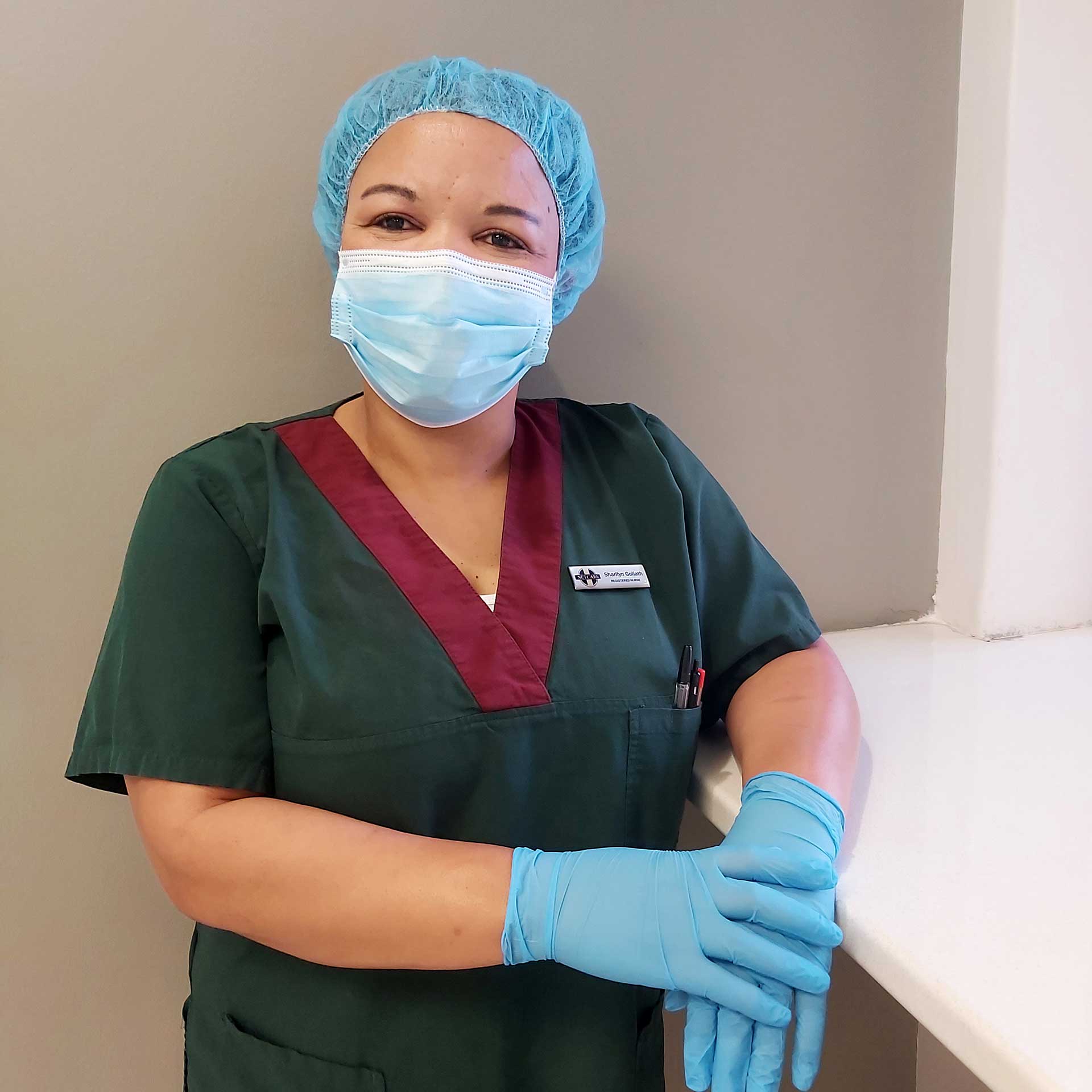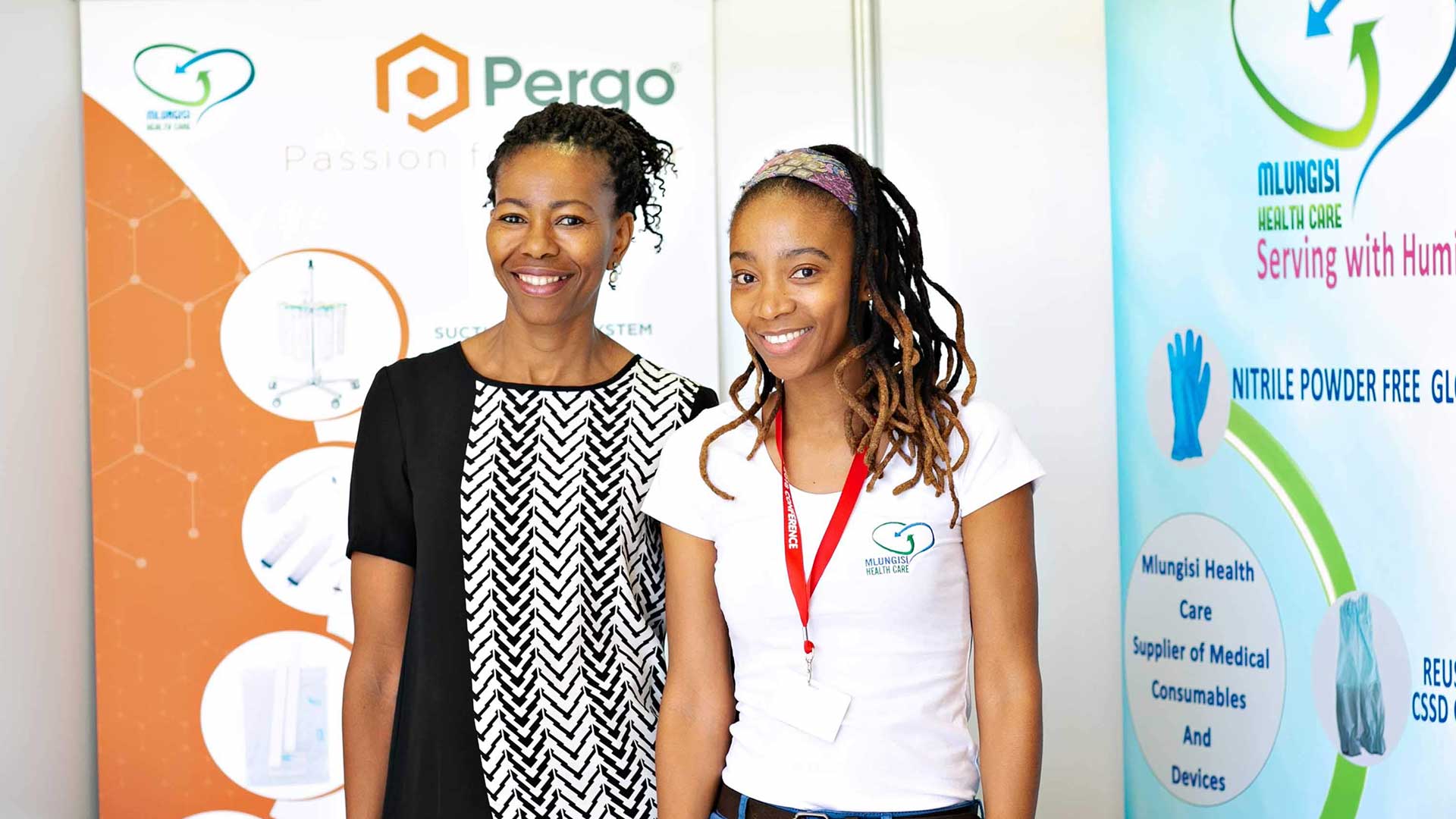SA interventional cardiologist demonstrates intricate heart repair procedure to continent’s doctors
Drickus Maartens • November 4, 2019
Educational live demonstration aims to advance cardiac treatment for patients in Africa
Cardiologists and other medical practitioners from around Africa recently had the opportunity to watch a South African professor expertly direct a special repair device via tiny wires and catheters towards a patient’s heart in order to repair a hole in this vital organ.
The live interactive demonstration by local interventional cardiologist, Professor Farrel Hellig, was performed in the cardiac catheterisation laboratory at Netcare Sunninghill Hospital in Johannesburg, from where it was streamed in real time to hundreds of delegates attending the 20th Pan-African Course on Interventional Cardiology
(PAFCIC) held in Tunisia recently.
Professor Hellig, a renowned interventional cardiologist and associate professor at the University of Cape Town’s Medical School, spoke participants through the intricate ‘keyhole’ procedure to close the hole, or flap, in the wall of the inter-atrial septum of the heart. This is known in medical terms as a patent foramen ovale (PFO) repair.
Professor Hellig, who is committed to education in interventional cardiology, and is known for sharing his knowledge widely with his colleagues, says that the heart repair procedure went well and the patient was discharged home from the hospital the following day.
The procedure was followed closely on a large screen by delegates in Tunisia, who were able to interact and engage with the professor throughout the procedure. Professor Hellig says the PFO is a relatively easy intervention for him and his team to perform, as they have undertaken many of them in recent years.
Held under the auspices of the Pan African Society of Cardiology (PASCAR), PAFCIC aims to educate the continent’s doctors on interventional cardiology, thereby aiming to improve cardiovascular care in Africa. Professor Hellig’s procedure was one of 10 performed by experts at centres around the continent to demonstrate to delegates the latest techniques in this sub-speciality. In addition to these live case transmissions, the PAFCIC programme included practical workshops and keynote lectures by international experts.
Professor Hellig explains that interventional cardiology is a sub-specialty of cardiology, and provides minimally invasive, image-guided diagnosis and treatment of cardiac conditions. He is regularly invited to demonstrate such techniques to delegates at the annual PAFCIC Congress as well as at other such international educational meetings. Last year, Professor Hellig demonstrated a live transcatheter aortic valve implantation (TAVI) — a procedure during which a diseased heart valve (aortic valve) is replaced with an artificial valve — to PAFCIC delegates.
“Interventional cardiology is revolutionising heart medicine in many important ways, and is becoming an increasingly critical sub-speciality both locally and around the world. However, the techniques involved can be complex and insufficient cardiologists in South Africa and on the African continent have had the opportunity to acquire the necessary skills,” notes Professor Hellig, speaking during Heart Awareness Month in South Africa.
“As a consequence, these approaches are still not widely available to the many vulnerable patients throughout the continent who could greatly benefit from them. I think that it is therefore of critical importance to familiarise as many of our colleagues as possible with these techniques.”
Professor Hellig has vast experience in interventional cardiology and performs scores of these intricate procedures every year. He also provides clinical training in interventional cardiology to post-graduate Masters’ students at Netcare Sunninghill Hospital through UCT. Netcare Sunninghill Hospital has been recognised as a UCT Medical School interventional cardiology teaching institution.
Highly-trained cardiologists now perform a range of procedures ranging from heart valve replacement and repair to the unblocking of blocked blood vessels with stents using minimally invasive techniques that are far less traumatic to the body than open-heart surgery, where large incisions have to be made to perform surgery.
“These procedures tend to reduce patients’ hospital stays and the recovery period. Moreover, they often enable us to treat highly compromised patients who might not have survived open heart surgery.”
Professor Hellig was also course director for AfricaPCR, the largest interventional meeting in Africa, which ran concurrently with SA Heart Congress and PASCAR, from 31 October to 3 November 2019. Five live demonstration procedures were performed as part of AfricaPCR at Netcare Sunninghill Hospital.
“I am always greatly honoured to be asked to perform such live demonstrations for events such as PAFCIC, which meaningfully contributes to the advancement of cardiovascular medicine, and interventional cardiology in particular, on the continent,” concludes Professor Hellig.
Further reading:
https://www.occlutech.com/int/professionals/products/pfo/

Sr Sharilyn Goliath, a theatre nurse at Netcare Greenacres Hospital, urges the public to protect themselves and others from COVID-19. Sr Goliath was recently recognised in a local radio station competition for her caring and meaningful contribution to fighting the spread of the disease within communities in Nelson Mandela Bay in the Eastern Cape.

Fever, body aches and pain are among the commonly reported symptoms of Covid-19 and are also associated with other viral infections, including influenza. While these symptoms can be most unpleasant, frequently they can be managed at home on the advice of a healthcare professional. It is crucial, however, that medications for relieving symptoms are always used appropriately and safely, a pharmacist warns. “Many Covid-19 patients describe experiencing severe headaches, body aches, sore throat and chest pain, and the most common symptoms reported are fever, chills, and shivers. Paracetamol has been proposed as the safest drug for relief of these symptoms, particularly pain and fever, for most of the population,” says pharmacist Ria Westerman of Medipost Pharmacy , South Africa’s largest national courier pharmacy. “Even though paracetamol is effective and very safe even for pregnant women and babies, as with all medicines, it is extremely important not to exceed the dosage that is specified on the packaging or recommended by your treating doctor. When taken in excessive doses, an overdose of this safe medicine can lead to toxic effects on the body,” she explains. How paracetamol can be helpful for Covid-19 home care Fever – a heightened body temperature of 37.5 degrees Celsius or more – is common in our bodies’ response to an infection such as Covid-19. “It has been noted that in certain cases, the pain and fever and other symptoms of the illness can feel so bad that the person becomes anxious and may even experience panic attacks, which could potentially worsen their situation. Fortunately fever, aches and pains can be effectively managed with paracetamol, which is inexpensive and readily available without the need for a doctor’s prescription.” Paracetamol still regarded as safest, 65 years later “Before the introduction of Paracetamol in 1955, all the other painkillers that were available either had unpleasant side-effects or a significant risk of the patient experiencing a bad reaction to the medicine. The development of paracetamol was an enormous breakthrough, and even up to this day it is still considered the safest analgesic [meaning ‘pain alleviating’] and anti-pyretic [meaning ‘fever reducing’] medicine available,” she explains. Although paracetamol is safe for all ages, from babies to adults, with very few side-effects and little interaction with other types of medicine, Westerman emphasises that all medicines should be used with care and only as advised. Avoiding overdose “There are many products containing paracetamol, which is the generic name for the compound, and it is available under many different brand names either as a single ingredient or in combination with other ingredients. Accidental overdose is unfortunately common, but can be avoided. If you are taking more than one type of medicine, it is important to check all the ingredients to ensure you do not exceed the safe dosage for paracetamol.” The standard dose for adults is 500mg (one tablet) to 1000mg (two tablets) four times per day. This means that 1000mg, or one gram, is the maximum dose for an adult in a six-hour period, which should never be exceeded, with a maximum of 4000mg (i.e. four grams equivalent to eight tablets) in 24 hours. “Unlike most other types of painkillers, paracetamol can be taken on an empty stomach without causing irritation. In terms of pain relief properties, this is significant as paracetamol can be more rapidly absorbed, bringing more intense relief sooner than most other common oral analgesics. It is a gentle yet powerful painkiller,” she says. Caution for some Westerman points out that paracetamol is unfortunately not suitable for people with liver or hepatic impairment, as it is metabolised or processed through the liver. “As alcohol dependence can affect liver function, these patients should seek their doctor’s advice and only take paracetamol on their recommendation,” Westerman advises. “There are very few interactions with other medications, of which the most significant is the interaction with anticoagulants (blood thinning), such as Warfarin, and people on such treatments should only take paracetamol under supervision or on the recommendation of a physician.” People who make use of Medipost Pharmacy’s chronic medication delivery service or self-medication online shop https://shop.medipost.co.za have access to telephonic clinical advice from pharmacists and pharmacist’s assistants in their preferred official South African language to discuss dosage, possible side-effects or interactions and any other concerns relating to their medication. This service is available from Monday to Friday, 08h00 to 22h00, and Saturdays between 08h00 and 12h00. “Although most people who fall ill with Covid-19 are able to recover at home with symptomatic relief, it is important to keep in regular contact with one’s treating doctor and seek medical attention immediately if symptoms worsen. It may also be reassuring to regularly check blood oxygen levels with an oximeter, which is available from leading pharmacies including the Medipost Pharmacy online shop,” Westerman notes. “It is crucial that any medicine is only ever used according to the manufacturer’s or a healthcare professional’s advice, as inappropriate use can be harmful. When taken safely, however, paracetamol can bring immense relief for symptoms of pain and fever during recovery from colds, influenza and less severe cases of Covid-19,” she concluded.

Studies from around the world show that individuals with underlying medical conditions are substantially more at risk for developing serious COVID-19 disease and/or complications requiring specialised hospital care. Should obese South Africans be concerned and what precautions can they take to reduce their risks? “ The World Health Organization (WHO) reports that more than 53.8% – more than half – of South Africa’s adults are overweight or obese. This is particularly concerning as a number of international studies show a link between obesity and serious COVID-19 infection,” says Dr Gert du Toit, a surgeon who practises at the multi-disciplinary metabolic centre at Netcare St Augustine’s Hospital , which is accredited as a Centre of Excellence for Metabolic Medicine by the South African Society for Surgery, Obesity and Metabolism (SASSO). “A recent study from the United Kingdom for example found that 73% of COVID-19 patients in intensive care were either overweight or obese. While we await national statistics in South Africa, there are indications that high blood pressure (hypertension), diabetes and obesity were common among those who have died from COVID-19 locally. “Furthermore, over 90% of deaths from COVID-19 in South Africa are recorded among individuals aged 40 years and older, which is the segment of the general population in which obesity and related comorbidities such as diabetes and hypertension tend to occur," adds Dr Du Toit. He goes on to explain that a number of lifestyle and other conditions are associated with obesity, including type 2 diabetes, metabolic syndrome, hypertension, heart disease, impaired glucose tolerance and sleep apnoea, which is a breathing disorder. “The WHO therefore warns that obesity also contributes to greater vulnerability to COVID-19 infection,” he adds. Dr Du Toit explains that many obese people, particularly those with a higher BMI and long duration of obesity, develop metabolic syndrome, which refers to a cluster of conditions occurring together, including high blood sugar levels (hyperglycaemia) and high blood pressure, abnormal cholesterol or triglyceride levels and excess body fat around the waist. The syndrome has been shown to increase the individual’s risk of developing heart disease, type II diabetes and of suffering a stroke. “Studies indicate that older patients and those with chronic medical conditions such as hypertension, diabetes and cardiovascular diseases are at higher risk following COVID-19 infection, which is thought to alter the immune response because of the metabolic syndrome,” he says. “It should be noted that patients with high blood sugar levels also often show a significant worsening of symptoms, which suggests that they suffer greater morbidity than individuals who do not have diabetes. This may be why younger overweight patients under the age of 50 and with a BMI of above 35 — who have no comorbidities, or medical conditions co-occurring with their obesity — are also being relatively hard hit by COVID-19.” “We are not entirely sure why this should be the case and the truth is that there is still much to learn about COVID-19. It is, however, thought that it may be associated with the fact that overweight people invariably have an altered inflammatory response leading to an over-aggressive immune system, which overreacts to infection and creates a cytokine storm that is responsible for acute respiratory distress syndrome.” In addition, obesity affects respiratory function both physiologically and mechanically, the excess levels of fat on the chest wall and belly putting pressure on the lungs and making it difficult for people with obesity to fill them to capacity with air even under normal circumstances. This reduced breathing capacity may add to respiratory distress in patients with COVID-19. Should obese South Africans be concerned then? Dr Du Toit cautions that all South Africans, and not just the obese, should take necessary precautions to avoid infection. "It should be noted that there are no indications that obese people acquire the viral infection more easily than the non-obese. However, once infected, obese people tend to develop more severe forms of COVID-19. Obese South Africans should observe the same measures to prevent getting infected, such as social distancing, regular hand washing, wearing of facial masks in public, and so on. Furthermore, people who have already been diagnosed with obesity-related conditions should take particular care to comply with their treatments and medical visits.” "For obese people and the general population, it is advisable to remain as healthy as possible and avoid weight gain through maintaining a balanced diet, and remaining physically active during this challenging time. Losing weight can meaningfully reduce the risks of developing serious COVID-19 disease and/or one of the other diseases of lifestyle that are associated with obesity.” Regarding whether metabolic surgery, such as that offered at the multi-disciplinary metabolic centre at Netcare St Augustine’s Hospital, can assist to reduce the health risks faced by obese individuals, Dr Du Toit said that it certainly can in selected obese patients. This is because metabolic surgery has an excellent success rate in resolving a host of conditions that are associated with obesity including metabolic syndrome and diabetes. “Given the fact that we are in the midst of the COVID-19 pandemic, the decision as to whether or not to have metabolic surgery depends upon the level of risk that the obesity poses to an individual’s health currently. Should they be at high risk of suffering from serious complications as a result of their obesity if they delay having a metabolic procedure, and can have the procedure performed safely, then we may recommend that it should go ahead,” he concludes.

The loss of a loved one is an intensely painful and devastating experience, and may often feel unreal. While grief and bereavement are experienced differently by everyone, there are some common aspects that may be helpful to understand, and to help one to eventually cope better with loss. “It is not only the passing of a loved one that leads to feelings of loss. People also experience grief in other events, for example when a relationship ends, or one loses a job or possessions such as one’s house as a result of financial difficulties. These instances have become increasingly common during the current COVID-19 pandemic,” says Megan Hosking, psychiatric intake clinician at Akeso mental health facilities. Stages of grief and bereavement “The most widely recognised stages of grief were first described by Dr Elizabeth Kübler-Ross, who was a Swiss-American psychiatrist. While these stages are often presented as a linear process, it is most important to realise that they are not meant to create neat and tidy packages for emotions, and do not necessarily follow in this order for everyone. “Individuals experience each of the stages of grief and bereavement differently, and the length of time that each stage may last also varies from one individual to the next. A person who grieves may also move backwards and forwards between the stages of the grieving process,” she explains. 1. Denial The first emotion many people experience following a loss is a state of shock and denial. Things may not feel real, make any sense, and the reality of the loss will not yet have set in. Denial may result in a person carrying on with life as though the loss has not happened and not feel the emotions associated with the loss. 2. Anger Anger can often feel endless; one may feel angry at others – the deceased person, one’s family, the circumstances, the health system, doctors, their employer other people, and even a higher power. Feelings of regret and guilt (whether perceived or real) often manifest as anger against others who one thinks may have contributed to, or caused, their loss. 3. Bargaining One may try to make arrangements, promises or bargain with others or a higher power to try and ‘reverse’ the loss, minimise one’s own sense of being harmed. This often happens when relationships end and one tries to get their partner ‘back’. 4. Depression This stage is often where reality starts to set in and a person moves their attention to the present situation. One may feel intense sadness, want to withdraw from others, or feel like doing nothing. Depression as a stage of grief is not the same as depression as a diagnosable mental health illness. A state of depression following the loss of a loved one or other significant loss is a normal and appropriate response, and often with time, will transition into a space of acceptance. 5. Acceptance Acceptance does not mean that everything suddenly feels right again, or that you are completely healed or ‘okay’ with the loss you have suffered. This stage is more about realising that life without your loved one or in your changed situation is the way things are going to be, and learning to live with that – even though it will still hurt, and you may still feel intense sadness or feel the loss daily. Sudden loss According to Hosking losing a loved one suddenly, as may be the case with the current COVID-19 pandemic, can be very traumatic and is also often experienced differently to a loss following a long-term illness or an expected loss. “There is no time to prepare for the loss, and often one may not have their full support system around. There may be lots of questions about the loss, the circumstances leading up to it, and what happened, and feelings of shock may last longer,” Hosking says. It is not uncommon following a sudden loss to experience strong emotional and physical responses, which can include: Shock symptoms such as shaking, inability to move, stomach aches and headaches, exhaustion, and feeling on edge. These will usually pass after a few days; if they don’t, one should seek professional assistance. Insomnia and nightmares. Feeling alone and that no one understands you and what you are going through. Anger and regret. “Following a loss, feelings of sadness, desperation, guilt, anger, loneliness, difficulty sleeping, mood changes, appetite and energy changes are normal. However, if any of these emotions feel overwhelming or persist for a long time, then seeking professional help is a wise option,” Hosking advises. Supporting a loved one “If someone close to you has lost a loved one – partner, parent, child or friend – it can be challenging to know how to support them and care for them,” adds Sandy Lewis, head of therapeutic services at Akeso. “When talking about loss, one needs to be very mindful of one's words, as it is a sensitive situation for all involved, and emotions are heightened. The conversation and support largely depend on the person experiencing the loss, your relationship with them, and their current circumstances,” she notes. When talking to someone who has experienced a loss, saying the following may be helpful to express support: “I am so sorry for your loss” “I don’t know how you feel, but I am here to help in any way I can” “You and your loved one are in my thoughts and prayers” “I am just a phone call away” or “I am up early or late if you need anything” “My favourite memory of your loved one is…” It is important to avoid saying things like: “At least he/she lived a long life, many people die young” (if an elderly person has passed) “Only the good die young” (for a young person) “He/she is in a better place” “There is a reason for everything” “I know how you feel” “Just be strong” “It’s for the best” (if the person who has passed had suffered seriously) “Be supportive but do not try to fix the loss or the situation,” Lewis advises. “Don’t tell people what to do or feel – even if you have experienced loss, remember that your experience is not the same as theirs. Recognise the loss and what it means to the person, and don’t put a time-frame on how long they can grieve.” “Other ways of showing support include making sure the person is safe, that their basic needs such as food are met, helping with their other responsibilities such as answering messages or paying bills, sending them a virtual hug if a real one is not possible in this time. However, involve them in decision-making where possible,” Lewis concludes.

As the Covid-19 peak hits South Africa, we are all being forced to find novel ways of managing daily risks as the world forges a path to a new normal. While every sphere of life has been touched by the pandemic, South Africa has no option but to keep moving forward, innovate and plan for the inescapable risks that have now become a reality of life – even for the most cautious. “We have all had to assimilate facemasks, sanitising and social distancing into our daily lives, but we cannot pretend that these precautions are a talisman providing complete protection from the threat of Covid-19,” says Bianca Viljoen, spokesperson for Health Squared Medical Scheme. “As the medical scheme that strives to have members covered from every angle, we are focused on protecting health long term, through early intervention and holistic support. From a healthcare funding perspective, it makes sense to enhance healthy members’ wellness as well as assisting at-risk members to better manage existing health conditions,” she explains. According to Viljoen, the Health Professions Council of South Africa’s recent revision of guidelines pertaining to telehealth in response to the Covid-19 pandemic has opened up new frontiers in managing healthcare risks and resources effectively. “The swiftness with which these guidelines were developed and adopted demonstrates our local healthcare professionals’ remarkable spirit of innovation in the service of patients. With medical consultations now just a phone call or video consultation away, this level of expert care is more accessible than ever. The convenience this offers healthcare consumers promotes earlier intervention, which is usually linked to better health outcomes,” she says. Health Squared members were among the first to have private Covid-19 testing covered by their medical scheme, irrespective of the result. “This allowed those who were infected in the first wave of the virus to learn their status earlier, and take the appropriate measures not only to reduce their chances of becoming seriously ill, but also to self-isolate early and help limit the spread of this highly contagious virus,” Viljoen explains. “Understanding that mental wellbeing and physical wellness are linked, all our members have free unlimited access to telephonic assistance with financial matters, psycho-social assistance and legal advice via the Agility Rewards programme. These assist services have particular significance in light of Covid-19, and are complemented with a health assist line that offers peace of mind as members know that healthcare advice from a team of nurses is only a phone call away.” Through Health Squared , members living with chronic illnesses have always had access to Agility Health’s unique Patient Driven Care™ programme that supports them in adhering to their prescribed treatment. Today, this means that many of these individuals’ conditions are so well managed that they face no greater risk of severe Covid-19 than the general population. “The pandemic has aroused a new awareness of health as a most precious asset. Having supported members to proactively reduce their clinical risks months and years before we had ever heard of the novel coronavirus, provides hope for better outcomes in the present Covid-19 scenario,” she says. “For individuals and employers navigating this new world, it is reassuring to be covered by a medical scheme that is dedicated to optimising all-round health and wellness at all times, as well as providing for curative healthcare when the need arises,” Viljoen concluded.

Mental health challenges and substance use disorders continue to affect people’s lives regardless of the unfolding COVID-19 pandemic. The pandemic has also, in some cases, brought about mental health challenges for individuals. It is therefore essential that specialised multi-disciplinary in-patient care remains available, even for those individuals who may be COVID-19 positive but are medically well, with mental health facilities ensuring that strict precautions are in place for the protection of all concerned. “Psychiatric conditions – such as depression, anxiety or mood disorders and addiction, frequently manifest at the same time, and it is of concern that the additional pressures many people are facing due to the pandemic could exacerbate underlying mental health challenges,” says Nickie Crookes, hospital manager of Akeso Stepping Stones and Akeso Milnerton in Cape Town. “To ensure that persons who may be in need of professional mental healthcare can be assisted at this time, we have introduced strict, though absolutely necessary, precautions to enable us to continue to provide in-patient treatment in a safe environment. Clients are therefore required to test for COVID-19, 48 to 72 hours prior to admission, and self-isolate from the time of their test until they enter our care. “Knowing the COVID-19 status of our clients enables us to take all the necessary precautions to safely treat and care for all, as well as to protect all healthcare workers at our facilities,” she explains. Individuals whose test result indicates they are COVID-19 negative will be cared for in a ‘green zone’, either at Akeso Milnerton or within Akeso Stepping Stones., Akeso Stepping Stones has been designated only for COVID-19 negative patients. “Even in these green zones, we have implemented additional hygiene, social distancing, daily screening and other precautions.” In the case of emergency admissions, testing will be performed on admission and the person will be cared for in isolation in a ‘yellow zone’ for persons under investigation (PUIs) at Akeso Milnerton until their test results become available. “We have also planned for the scenario where a COVID-19 positive patient is medically well enough to not require acute hospital care, but is in urgent need of professional mental health support. Akeso Milnerton has a specially isolated ‘red zone’, which is specifically equipped for the care of positive patients who are medically stable,” Crookes notes. “Stringent precautions are in place to prevent transmission from persons in the ‘red zone’, and all practitioners and staff members wear appropriate protective personal equipment [PPE]. Patients who are admitted with COVID-19 are carefully monitored for changes in their medical condition, and can be transferred to hospital for medical care should the need arise.” Akeso Milnerton offers specialist in-patient treatment for a range of mental health conditions, including anxiety and depression, substance abuse and addiction and post-traumatic stress disorder. The facility has units dedicated to general psychiatry, dual diagnosis, and adolescent care, and a specialist service for treating adolescents with eating disorders. Akeso Stepping Stones specialises in dual diagnosis, providing integrated treatment programmes that take into account that addiction and psychiatric conditions are often strongly interrelated, and has a detoxification programme managed by Dr Duncan Laurenson, a medical practitioner and substance use disorder specialist. “It is often difficult to separate the effects of substance use disorders from those of underlying mental health issues, and our multi-disciplinary team is highly experienced in holistic integrated treatment,” Crookes adds. “While there is much focus on COVID-19 at present in South Africa, our message to the public is that mental health should always remain a priority. From our side, Akeso facilities have spared no effort to ensure we can continue to provide treatment safely during the pandemic,” she concludes.

With thousands of new Covid-19 infections occurring daily in South Africa and the possibility of contracting the virus likely to increase over the next few months, have you thought about what would happen if you did catch the infection and would have to self isolate for two weeks, or, even worse, require hospitalisation? “While more than 80% of people are only likely to be mildly ill with Covid-19, there are still things that you should plan and organise if you have to self-isolate at home for the obligatory 14 days. So it is well worth doing a bit of ‘scenario planning’ and considering the things that need to be put in place in the event that you do contract the infection,” advises Geraldine Bartlett, Chief Professional Officer at Universal Healthcare , one of South Africa’s foremost healthcare companies. “As none of us ultimately knows how seriously we may get the disease, it may be sensible to plan ahead in the event that we become one of those unfortunate enough to require hospitalisation. This is particularly important for those who are living alone, a single parent living with young children, or someone who is at risk of developing a more serious Covid-19 infection,” she adds. The importance of contingency planning Bartlett, who is also a qualified pharmacist, believes it is now important for all South Africans to prepare for the possibility of becoming infected and shares a number of tips on how to plan for such an eventuality. “If you live with others it is a good idea to talk with the members of your household to establish what they should do in the event that you do get sick. Together you can plan who will prepare the meals, do the laundry, go out to do the shopping, take the children to school, walk the dogs, and so on,” she advises. According to Bartlett, it is especially important to identify a specific room or part of the house where you can stay separated from the rest of the household while in isolation in the event you do contract the illness. If this is not possible then it will be important to wear surgical masks inside the home. Ideally, you should also have your own designated bathroom but if you have to share, make sure you carefully clean the facilities after every use. “Should you live alone it is important that you have someone check in on you once a day – either by phone or via a messaging service. Plan in advance who this individual will be and discuss it with them to get their buy-in. It can also be a good idea to give a set of keys to someone who can assist you if your illness worsens suddenly and you become incapacitated. “If you are a single parent it is important to make plans regarding who would look after your children if you have to go to hospital. Discuss these contingencies with the individual concerned beforehand. Should you have pets, make plans about who would care for them if you needed to be hospitalised.” Bartlett says that it should be remembered that people over the age of 60 and those with chronic conditions, such as diabetes, hypertension, chronic lung disease, cancer, and kidney failure, are at higher risk of getting seriously ill if they get infected. “You should therefore develop a strategy about what to do about these vulnerable people in your home if you or another member of the household get sick with Covid-19. It may be a good idea to plan for vulnerable individuals to rather stay elsewhere while you are self-isolating.” What is self-isolating? Fortunately, most people who get COVID-19 will have only a mild illness and should recover at home. If you have been asked to self-isolate at home, you should: Stay at home for 14 days; Not go to work; Not leave your home to go anywhere, except for medical care; Not have visitors to your home; rather keep in touch with your family, friends and colleagues by phone, email and/or social media. Ask family or friends to help get/buy things you need such as groceries or medicines. “It is most important that you follow these instructions otherwise you may well spread the virus in the community,” she emphasises. Stocking up for self-isolation Bartlett says you should stock up with items you will need if you have to be in self-isolation at home for the period of 14 days. Things you should make sure you have an adequate supply of beforehand include your chronic medicines; paracetamol; throat spray; toiletries; and of course sufficient non-perishable foods. “Those who have contracted the virus should take care to monitor their symptoms carefully. This is particularly important for individuals who are at greater risk of developing a serious disease. You should call your doctor if your symptoms are getting worse, your symptoms have not improved after seven days, or if you have any symptoms that are concerning to you. What is a Covid-19 emergency? “It is also important to be ready in case of an emergency due to Covid-19 infection. One way you can do this is by making a list of important things such as your doctor’s telephone number, the contact details of the nearest, or preferred, hospital and emergency service, your medical scheme details, and a list of the chronic medicines you are taking. Keep this list to hand and give a copy to the person who will help you if your illness suddenly becomes worse.” So what exactly are the signs of a possible Covid-19 emergency? Bartlett says that these warning signs may include: Trouble breathing; Chest pain or pressure in your chest that does not go away; Coughing up blood; Becoming confused; Severe sleepiness (inability to wake or stay awake); Blue lips or face. “Should you develop any of these warning signs, you or a member of your household should call your nearest hospital or emergency services immediately and notify them that you have a confirmed case of Covid-19 disease. Avoid taking public transport to the hospital – either use private transport, preferably with windows rolled down, or call emergency services for an ambulance if required. And you should always, of course, wear a face mask if you travel to seek medical care,” she advises. “While we may not always be able to control every aspect of our lives during a global pandemic, we can take action to ensure that we are as empowered as possible in the event that we do get ill and have to spend time in self-isolation , or be hospitalised. A bit of planning can go a long way to not only keeping us all safer but also provides us with a greater sense of control over these unusual and unprecedented circumstances in which we find ourselves at this time,” concludes Bartlett.

This Nelson Mandela Day the Cancer Association of South Africa (CANSA) gives back to cancer patients, those affected by cancer and caregivers by launching its CANSA Tele Counselling service. This is confidential, professional, cancer-related telephonic counselling to cancer patients, caregivers and their families and parents or guardians of children living with cancer. Counselling is available in seven languages (English, Afrikaans, isiXhosa, isiZulu, siSwati, Sesotho and Setswana) and is free of charge. #CANSATeleCounselling #ConnectWithHope #MandelaDay Gerda Strauss, CANSA’s Head of Service Delivery says, “We challenge all to take action and to inspire change this Mandela Day, by donating and sponsoring 67 minutes of counselling. Help us with the costs and expenses to run the service and provide continued in-service training and debriefing sessions to counsellors. We don’t want to add the burden of payment for these sessions to those who are already battling, so we need your help. Even Madiba, when he was first diagnosed with prostate cancer in 2001, reached out to CANSA and benefitted from our support and we’d like to be there for more patients and loved ones and connect with hope. Our launch includes a webinar in mid-August to health professionals to celebrate this Tele Counselling, in addition to our face-to-face counselling services since 1931.” Donate here . CANSA has been developing an in-house telephonic counselling service for some time as cancer takes a psychological, emotional and physical toll on cancer patients. This service has just been accelerated due to the limited specialised support available to cancer patients, their caregivers and families during the lockdown period, when face-to-face contact and limited virtual support is not always possible as a result of the COVID-19 pandemic. Strauss adds, “Patients are feeling frustrated and despondent as they struggle to access vital support services. A cancer patient’s low immunity and high infection risk for COVID-19, results in anxiety and social distancing and hygiene measures add to a feeling of isolation even as lockdown levels are eased. So, this is the perfect time to launch the telephonic counselling. The establishment of this service will not only serve patients during this difficult period, but will become a permanent care and support offering, enabling patients who live far from our Care Centres to also access support and in a language of choice. It’s available during normal business hours.” “We’re thrilled and thankful that we can partner with Novartis and Roche who made it possible for CANSA to establish and set up this specialised support system in place for cancer patients and loved ones,” concluded Strauss. CANSA Tele Counselling can be accessed via the CANSA Help Desk on 0800 22 66 22 toll-free to make an appointment with a CANSA counsellor. Or send an email to counselling@cansa.org.za . For more information, please contact Lucy Balona, Head: Marketing and Communication at CANSA at email lbalona@cansa.org.za. Call 011 616 7662 or mobile 082 459 5230.





